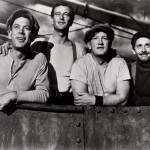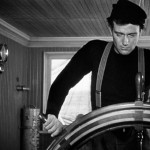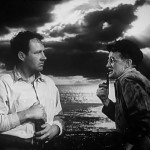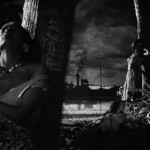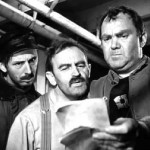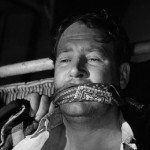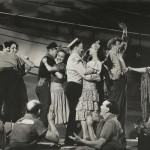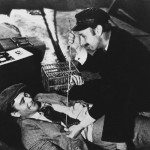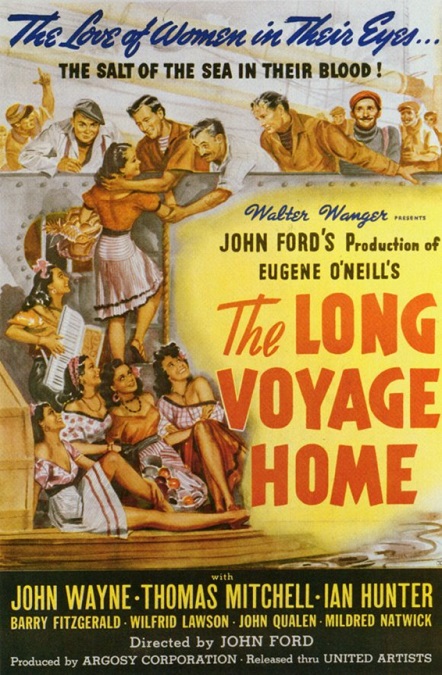
The Long Voyage Home – 1940
This was an average movie that had a very poignant ending. It was an ending that put me in mind of the 1967 musical, Hair, but I’ll get to that in a bit. One man goes to death in the place of his friend. The film starred John Wayne and Thomas Mitchell. Wayne was passable, but only barely. Mitchell, as always, was fantastic.
First, I’ll talk about why John Wayne didn’t do so well. It was the wrong role for him. He played the part of Ole Olsen, a Swedish sailor aboard a British cargo ship called the SS Glencairn. He was supposed to be the strong, silent type, the kind of character that John Wayne was known for. He was the honest farm-boy that had a good heart and a clear head.
Everything was just fine until he had to speak. His dialogue was written in broken English, as if he didn’t have a full grasp of the language. But on top of that, they also tried to give him a Swedish accent. Wayne’s accent was terrible and, though I am sorry to say it, he came off as sounding like someone who is mentally challenged. It took me out of the story at a time where it was crucial to be invested in the plot.
Thomas Mitchell, on the other hand, portrayed the character of Driscoll, an Irish man who had lived the life of a sailor for many years. He seemed to hold the position of the unspoken leader of the tight-knit crew. He was a little low on smarts but big on heart. When there was a problem, it was Driscoll to whom they all turned.
Mitchell was also given a heavy Irish accent, which he delivered perfectly well, never letting it slip or sound forced. He had the big emotional scene in which his long-time shipmate died, giving me one of the longest death scenes since Regis Toomey’s in the 1928/1929 Best Picture Nominee, Alibi.
Though there didn’t seem to be a lead character who was clearly defined, the plot revolved around Ole’s final voyage as a sailor before returning to his family in Stockholm. Of course, what would a movie made in 1942 do without the threat of the Germans ruining everything? While sailing from the West Indies, to Baltimore, and then on to England, they encounter deadly weather and German fighter planes, each of which claims the life of a crew member.
The real surprise came, like I mentioned, at the end, and here is where I was vaguely reminded of the ending of the Broadway Musical, Hair. The Glencairn finally arrives in England and the crew goes ashore, determined to a man not to go to sea again after their dangerous voyage. As they are walking away from the docks, the captain of another ship calls down to the sailors , saying that they are short a crew-man and asks for a volunteer.
Driscoll recognizes the ship, the Amindra, and warns the men to stay away, saying that he had once sailed with the ship and was treated horribly by its cruel Captain. They laugh and walk away. They find a bar and spend their money getting drunk. During the revelries, Ole is drugged and kidnapped by the men of the Amindra.
When the inebriated crew of the Glencairn learn of his misfortune, they raid the ship, led by Driscoll, and rescue Ole. But as they are leaving, Driscoll is knocked unconscious and left behind in the confusion. The Amindra has its extra crew man and leaves port. The next scene is of the men, minus Ole, boarding the Glencairn with their heads held low. A newspaper is dropped into the ocean, revealing that Amindra was sunk by German torpedoes and that there were no survivors.
The ending was profound in its own way, but I felt like the rest of the movie took its own sweet time getting there. The sub-plots of Smitty’s alcoholism and tragic death, and of the Glencairn’s final cargo of dynamite had only a vague relevance to the main plot, of which I admit, there wasn’t much to begin with. However, I did like the different and distinct personalities of the individual members of the crew. I liked the obvious bonds of friendship that existed between them. But though those relationships enhanced the plot, they could not create it.
Two other actors whom I enjoyed were Barry Fitzgerald and John Qualen, playing the parts of the steward, Cocky, and deck-hand, Axel. Both men stood out to me as good actors portraying likeable characters. Also, there were a few scenes in which Ian Hunter, playing the part of Smitty, got to do some dramatic brooding, bringing a small amount of pathos to otherwise dry script.
But Best Picture nomination? I’m skeptical.
